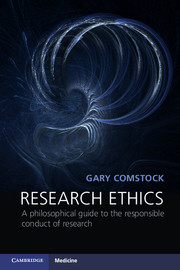
-
Select format
-
- Publisher:
- Cambridge University Press
- Publication date:
- 05 February 2013
- 03 January 2013
- ISBN:
- 9780511902703
- 9780521187084
- Dimensions:
- Weight & Pages:
- Dimensions:
- (234 x 156 mm)
- Weight & Pages:
- 0.52kg, 310 Pages
You may already have access via personal or institutional login
Book description
Education in the responsible conduct of research typically takes the form of online instructions about rules, regulations, and policies. Research Ethics takes a novel approach and emphasizes the art of philosophical decision-making. Part A introduces egoism and explains that it is in the individual's own interest to avoid misconduct, fabrication of data, plagiarism and bias. Part B explains contractualism and covers issues of authorship, peer review and responsible use of statistics. Part C introduces moral rights as the basis of informed consent, the use of humans in research, mentoring, intellectual property and conflicts of interests. Part D uses two-level utilitarianism to explore the possibilities and limits of the experimental use of animals, duties to the environment and future generations, and the social responsibilities of researchers. This book brings a fresh perspective to research ethics and will engage the moral imaginations of graduate students in all disciplines.
Reviews
“…Unique in several respects…it conveys an imperative for ethical thinking, decision-making, and moral action in research…it stimulates the moral imaginations of readers, and motivates a question-asking approach to research ethics..."
- Doody's Review Service
Contents
Metrics
Full text views
Full text views help Loading metrics...
Loading metrics...
* Views captured on Cambridge Core between #date#. This data will be updated every 24 hours.
Usage data cannot currently be displayed.
Accessibility standard: Unknown
Why this information is here
This section outlines the accessibility features of this content - including support for screen readers, full keyboard navigation and high-contrast display options. This may not be relevant for you.
Accessibility Information
Accessibility compliance for the PDF of this book is currently unknown and may be updated in the future.


